Piano Sheet Music
 "... it was just there for me one day ... literally wrote in five minutes ... kind of a gift from a higher place that all of us are eligible for. We just have to listen for it and be available to receive it" Eric Johnson
"... it was just there for me one day ... literally wrote in five minutes ... kind of a gift from a higher place that all of us are eligible for. We just have to listen for it and be available to receive it" Eric Johnson
Christopher Norton

Christopher Norton (born 1953) is a New Zealand-born British pianist and composer. Norton obtained a degree in music from the University of Otago in 1974. He taught music in Wellington high schools, worked as a composer-in-Schools for a year, then free-lanced as a composer, arranger and pianist.
He moved to the UK in 1977 on a New Zealand Government Scholarship. His earliest publications were with Universal Edition in London, and included Carol Jazz — improvisations on Christmas tunes — and Sing'n'Swing, for choir, piano and percussion.
In 1983, Norton was signed by Boosey & Hawkes, and the first of the Microjazz series appeared, an educational music series that has expanded over 20 years to include music for all of the major instruments with piano, ensemble books and midi file backings. It is now the biggest selling music series for Boosey & Hawkes, with over a million sales to date. Boosey & Hawkes claims that it is "one of the most widely used educational series ever published."
He moved to the UK in 1977 on a New Zealand Government Scholarship. His earliest publications were with Universal Edition in London, and included Carol Jazz — improvisations on Christmas tunes — and Sing'n'Swing, for choir, piano and percussion.
In 1983, Norton was signed by Boosey & Hawkes, and the first of the Microjazz series appeared, an educational music series that has expanded over 20 years to include music for all of the major instruments with piano, ensemble books and midi file backings. It is now the biggest selling music series for Boosey & Hawkes, with over a million sales to date. Boosey & Hawkes claims that it is "one of the most widely used educational series ever published."
Brahms

Johannes Brahms (May 7, 1833 â April 3, 1897) was a German composer of the Romantic period. He was born in Hamburg and in his later years he settled in Vienna, Austria.
Brahms maintained a Classical sense of form and order in his works â in contrast to the opulence of the music of many of his contemporaries. Thus many admirers (though not necessarily Brahms himself) saw him as the champion of traditional forms and "pure music," as opposed to the New German embrace of program music.
Brahms venerated Beethoven: in the composer's home, a marble bust of Beethoven looked down on the spot where he composed, and some passages in his works are reminiscent of Beethoven's style. The main theme of the finale of Brahms's First Symphony is reminiscent of the main theme of the finale of Beethoven's Ninth, and when this resemblance was pointed out to Brahms he replied that any ass â jeder Esel â could see that.
Ein deutsches Requiem was partially inspired by his mother's death in 1865, but also incorporates material from a Symphony he started in 1854, but abandoned following Schumann's suicide attempt. He once wrote that the Requiem "belonged to Schumann". The first movement of this abandoned Symphony was re-worked as the first movement of the First Piano Concerto.
Brahms also loved the Classical composers Mozart and Haydn. He collected first editions and autographs of their works, and edited performing editions. He also studied the music of pre-classical composers, including Giovanni Gabrieli, Johann Adolph Hasse, Heinrich Schütz and especially Johann Sebastian Bach. His friends included leading musicologists, and with Friedrich Chrysander he edited an edition of the works of François Couperin. He looked to older music for inspiration in the arts of strict counterpoint; the themes of some of his works are modelled on Baroque sources, such as Bach's The Art of Fugue in the fugal finale of Cello Sonata No. 1, or the same composer's Cantata No. 150 in the passacaglia theme of the Fourth Symphony's finale.
Brahms maintained a Classical sense of form and order in his works â in contrast to the opulence of the music of many of his contemporaries. Thus many admirers (though not necessarily Brahms himself) saw him as the champion of traditional forms and "pure music," as opposed to the New German embrace of program music.
Brahms venerated Beethoven: in the composer's home, a marble bust of Beethoven looked down on the spot where he composed, and some passages in his works are reminiscent of Beethoven's style. The main theme of the finale of Brahms's First Symphony is reminiscent of the main theme of the finale of Beethoven's Ninth, and when this resemblance was pointed out to Brahms he replied that any ass â jeder Esel â could see that.
Ein deutsches Requiem was partially inspired by his mother's death in 1865, but also incorporates material from a Symphony he started in 1854, but abandoned following Schumann's suicide attempt. He once wrote that the Requiem "belonged to Schumann". The first movement of this abandoned Symphony was re-worked as the first movement of the First Piano Concerto.
Brahms also loved the Classical composers Mozart and Haydn. He collected first editions and autographs of their works, and edited performing editions. He also studied the music of pre-classical composers, including Giovanni Gabrieli, Johann Adolph Hasse, Heinrich Schütz and especially Johann Sebastian Bach. His friends included leading musicologists, and with Friedrich Chrysander he edited an edition of the works of François Couperin. He looked to older music for inspiration in the arts of strict counterpoint; the themes of some of his works are modelled on Baroque sources, such as Bach's The Art of Fugue in the fugal finale of Cello Sonata No. 1, or the same composer's Cantata No. 150 in the passacaglia theme of the Fourth Symphony's finale.
Eric Satie

Éric Alfred Leslie Satie (Honfleur, 17 May 1866 – Paris, 1 July 1925) was a French composer and pianist. Starting with his first composition in 1884, he signed his name as Erik Satie.
Satie was introduced as a "gymnopedist" in 1887, shortly before writing his most famous compositions, the Gymnopédies. Later, he also referred to himself as a "phonometrician" (meaning "someone who measures sounds") preferring this designation to that of "musician", after having been called "a clumsy but subtle technician" in a book on contemporary French composers published in 1911.
In addition to his body of music, Satie also left a remarkable set of writings, having contributed work for a range of publications, from the dadaist 391 to the American Vanity Fair. Although in later life he prided himself on always publishing his work under his own name, in the late nineteenth century he appears to have used pseudonyms such as Virginie Lebeau and François de Paule in some of his published writings.
Satie was a colourful figure in the early 20th century Parisian avant-garde. He was a precursor to later artistic movements such as minimalism, repetitive music, and the Theatre of the Absurd.
Satie was introduced as a "gymnopedist" in 1887, shortly before writing his most famous compositions, the Gymnopédies. Later, he also referred to himself as a "phonometrician" (meaning "someone who measures sounds") preferring this designation to that of "musician", after having been called "a clumsy but subtle technician" in a book on contemporary French composers published in 1911.
In addition to his body of music, Satie also left a remarkable set of writings, having contributed work for a range of publications, from the dadaist 391 to the American Vanity Fair. Although in later life he prided himself on always publishing his work under his own name, in the late nineteenth century he appears to have used pseudonyms such as Virginie Lebeau and François de Paule in some of his published writings.
Satie was a colourful figure in the early 20th century Parisian avant-garde. He was a precursor to later artistic movements such as minimalism, repetitive music, and the Theatre of the Absurd.
Yiruma

Yiruma (born February 15 1978, Seoul, Korea) is a South Korean piano music composer. He is married to Son Hye-im.
Yiruma is well-known throughout the world, and his albums are sold all over Asia, as well as the United States and Europe. His most famous pieces are "Kiss the Rain", and also "River Flows in You". These pieces are widely mistaken for being associated with the movie Twilight. Although he formerly held dual citizenship as a citizen of the United Kingdom and South Korea, in July 2006 he gave up his British citizenship and entered the Republic of Korea Navy to begin his military service, which is compulsory for all male South Koreans. He has lived in Osaka, Japan for 5 years to promote album sales before giving up his dual citizenship.
Yiruma is well-known throughout the world, and his albums are sold all over Asia, as well as the United States and Europe. His most famous pieces are "Kiss the Rain", and also "River Flows in You". These pieces are widely mistaken for being associated with the movie Twilight. Although he formerly held dual citizenship as a citizen of the United Kingdom and South Korea, in July 2006 he gave up his British citizenship and entered the Republic of Korea Navy to begin his military service, which is compulsory for all male South Koreans. He has lived in Osaka, Japan for 5 years to promote album sales before giving up his dual citizenship.
Hoagy" Carmichael

Hoagland Howard "Hoagy" Carmichael was an American singer, songwriter, and actor. American composer and author Alec Wilder described Carmichael as the "most talented, inventive, sophisticated and jazz-oriented of all the great craftsmen" of pop songs in the first half of the 20th century.
Beethoven

Ludwig van Beethoven (16 December 1770 - 26 March 1827) was a German composer and pianist. He was a crucial figure in the transitional period between the Classical and Romantic eras in Western classical music, and remains one of the most respected and influential composers of all time.
Born in Bonn, then in the Electorate of Cologne (now in modern-day Germany), he moved to Vienna in his early twenties and settled there, studying with Joseph Haydn and quickly gaining a reputation as a virtuoso pianist. Beethoven's hearing gradually deteriorated beginning in his twenties, yet he continued to compose masterpieces, and to conduct and perform, even after he was completely deaf.
Born in Bonn, then in the Electorate of Cologne (now in modern-day Germany), he moved to Vienna in his early twenties and settled there, studying with Joseph Haydn and quickly gaining a reputation as a virtuoso pianist. Beethoven's hearing gradually deteriorated beginning in his twenties, yet he continued to compose masterpieces, and to conduct and perform, even after he was completely deaf.
Chopin

Frédéric Chopin (1 March 1810 – 17 October 1849) was a Polish composer and virtuoso pianist of the Romantic period. He is widely regarded as the greatest Polish composer, and ranks as one of music's greatest tone poets.
He was born in the village of Żelazowa Wola, in the Duchy of Warsaw, to a Polish mother and French-expatriate father, and in his early life was regarded as a child-prodigy pianist. In November 1830, at the age of 20, Chopin went abroad; following the suppression of the Polish November Uprising of 1830–31, he became one of many expatriates of the Polish "Great Emigration."
In Paris, he made a comfortable living as a composer and piano teacher, while giving few public performances. A Polish patriot,
Chopin's extant compositions were written primarily for the piano as a solo instrument. Though technically demanding, Chopin's style emphasizes nuance and expressive depth rather than virtuosity. Chopin invented musical forms such as the ballade and was responsible for major innovations in forms such as the piano sonata, waltz, nocturne, étude, impromptu and prelude. His works are mainstays of Romanticism in 19th-century classical music.
He was born in the village of Żelazowa Wola, in the Duchy of Warsaw, to a Polish mother and French-expatriate father, and in his early life was regarded as a child-prodigy pianist. In November 1830, at the age of 20, Chopin went abroad; following the suppression of the Polish November Uprising of 1830–31, he became one of many expatriates of the Polish "Great Emigration."
In Paris, he made a comfortable living as a composer and piano teacher, while giving few public performances. A Polish patriot,
Chopin's extant compositions were written primarily for the piano as a solo instrument. Though technically demanding, Chopin's style emphasizes nuance and expressive depth rather than virtuosity. Chopin invented musical forms such as the ballade and was responsible for major innovations in forms such as the piano sonata, waltz, nocturne, étude, impromptu and prelude. His works are mainstays of Romanticism in 19th-century classical music.
Elton John

Sir Elton Hercules John CBE (born Reginald Kenneth Dwight on 25 March 1947) is an English pop/rock singer, composer and pianist.
In his four-decade career, John has been one of the dominant forces in rock and popular music, especially during the 1970s. He has sold over 200 million records, making him one of the most successful artists of all time. He has more than 50 Top 40 hits including seven consecutive No. 1 U.S. albums, 59 Top 40 singles, 16 Top 10, four No. 2 hits, and nine No. 1 hits. He has won five Grammy awards and one Academy Award. His success has had a profound impact on popular music and has contributed to the continued popularity of the piano in rock and roll. In 2004, Rolling Stone ranked him #49 on their list of the 100 greatest artists of all time.
Some of the characteristics of John's musical talent include an ability to quickly craft melodies for the lyrics of songwriting partner Bernie Taupin, his former rich tenor (now baritone) voice, his classical and gospel-influenced piano, the aggressive orchestral arrangements of Paul Buckmaster among others and the flamboyant fashions, outlandishly excessive eyeglasses, and on-stage showmanship, especially evident during the 1970s.
John was inducted into the Rock and Roll Hall of Fame in 1994. He has been heavily involved in the fight against AIDS since the late 1980s, and was knighted in 1998. He entered into a civil partnership with David Furnish on 21 December 2005 and continues to be a champion for LGBT social movements. On April 9, 2008, John held a benefit concert for Hillary Clinton's presidential campaign, raising $2.5 million.
In his four-decade career, John has been one of the dominant forces in rock and popular music, especially during the 1970s. He has sold over 200 million records, making him one of the most successful artists of all time. He has more than 50 Top 40 hits including seven consecutive No. 1 U.S. albums, 59 Top 40 singles, 16 Top 10, four No. 2 hits, and nine No. 1 hits. He has won five Grammy awards and one Academy Award. His success has had a profound impact on popular music and has contributed to the continued popularity of the piano in rock and roll. In 2004, Rolling Stone ranked him #49 on their list of the 100 greatest artists of all time.
Some of the characteristics of John's musical talent include an ability to quickly craft melodies for the lyrics of songwriting partner Bernie Taupin, his former rich tenor (now baritone) voice, his classical and gospel-influenced piano, the aggressive orchestral arrangements of Paul Buckmaster among others and the flamboyant fashions, outlandishly excessive eyeglasses, and on-stage showmanship, especially evident during the 1970s.
John was inducted into the Rock and Roll Hall of Fame in 1994. He has been heavily involved in the fight against AIDS since the late 1980s, and was knighted in 1998. He entered into a civil partnership with David Furnish on 21 December 2005 and continues to be a champion for LGBT social movements. On April 9, 2008, John held a benefit concert for Hillary Clinton's presidential campaign, raising $2.5 million.
Debussy

Achille-Claude Debussy (August 22, 1862 – March 25, 1918) was a French composer. Along with Maurice Ravel, he is considered one of the most prominent figures working within the field of Impressionist music, though he himself intensely disliked the term when applied to his compositions. Debussy was not only among the most important of all French composers but also was a central figure in all European music at the turn of the twentieth century.
Debussy's music virtually defines the transition from late-Romantic music to twentieth century modernist music. In French literary circles, the style of this period was known as Symbolism, a movement that directly inspired Debussy both as a composer and as an active cultural participant.
Debussy's music virtually defines the transition from late-Romantic music to twentieth century modernist music. In French literary circles, the style of this period was known as Symbolism, a movement that directly inspired Debussy both as a composer and as an active cultural participant.
Isaac Albeniz

Isaac Albéniz i Pascual (Spanish pronunciation: ) (May 29, 1860 – May 18, 1909) was a Spanish pianist and composer best known for his piano works based on folk music.
Albéniz’ Suite Española Op.47 is comprised mainly of pieces written in 1886, and grouped together in 1887 in honor of the Queen of Spain. Like many of Albéniz' piano pieces, these works are miniature tone pictures of different geographical regions and musical idioms of Spain. The eight original titles are Granada, Cataluna, Sevilla, Cadiz, Asturias, Aragon, Castilla and Cuba but only the first three titles and Cuba appeared in the original collection. The other pieces were published in later collections, often with different titles. The publisher Hofmeister published all eight titles of Suite Espanola in 1911 after Albéniz’ death, appropriating other pieces for the other four titles so those pieces do not always accurately reflect the geographic designation of the titles, most obviously in the case of Asturias (Leyenda) whose Andalusian flamenco rhythms bear little resemblance to the music of the northern province Asturias. The opus number 47 assigned by Hofmeister has no relation to any chronological order in Albéniz’ oeuvre, in which opus numbers were randomly given by publishers or by Albéniz himself, with some pieces appearing in more than one collection.
Albéniz’ Suite Española Op.47 is comprised mainly of pieces written in 1886, and grouped together in 1887 in honor of the Queen of Spain. Like many of Albéniz' piano pieces, these works are miniature tone pictures of different geographical regions and musical idioms of Spain. The eight original titles are Granada, Cataluna, Sevilla, Cadiz, Asturias, Aragon, Castilla and Cuba but only the first three titles and Cuba appeared in the original collection. The other pieces were published in later collections, often with different titles. The publisher Hofmeister published all eight titles of Suite Espanola in 1911 after Albéniz’ death, appropriating other pieces for the other four titles so those pieces do not always accurately reflect the geographic designation of the titles, most obviously in the case of Asturias (Leyenda) whose Andalusian flamenco rhythms bear little resemblance to the music of the northern province Asturias. The opus number 47 assigned by Hofmeister has no relation to any chronological order in Albéniz’ oeuvre, in which opus numbers were randomly given by publishers or by Albéniz himself, with some pieces appearing in more than one collection.
Hiromi Uehara

Hiromi Uehara (上原ひろみ, born 26 March 1979), known as Hiromi, is a jazz composer and pianist born in Hamamatsu, Japan. She is known for her virtuosic technique, energetic live performances and blend of musical genres such as post-bop, progressive rock, classical and fusion in her compositions.
Mariah Carey

Mariah Carey (born March 27, 1970) is an American singer, songwriter, record producer, and actress. She made her recording debut in 1990 under the guidance of Columbia Records executive Tommy Mottola, and became the first recording artist to have her first five singles top the U.S. Billboard Hot 100 chart. Following her marriage to Mottola in 1993, a series of hit records established her position as Columbia's highest-selling act. According to Billboard magazine, she was the most successful artist of the 1990s in the United States.
Following her separation from Mottola in 1997, Carey introduced elements of hip hop into her album work, to much initial success, but her popularity was in decline when she left Columbia in 2001, and she was dropped by Virgin Records the following year after a highly publicized physical and emotional breakdown, as well as the poor reception given to Glitter, her film and soundtrack project. In 2002, Carey signed with Island Records, and after a relatively unsuccessful period, she returned to pop music in 2005.
Carey was named the best-selling female pop artist of the millennium at the 2000 World Music Awards. She has had the most number-one singles for a solo artist in the United States (eighteen; second artist overall behind The Beatles), where, according to the Recording Industry Association of America, she is the third best-selling female and sixteenth overall recording artist. In addition to her commercial accomplishments, Carey has earned five Grammy Awards, and is well-known for her vocal range, power, melismatic style, and use of the whistle register.
Following her separation from Mottola in 1997, Carey introduced elements of hip hop into her album work, to much initial success, but her popularity was in decline when she left Columbia in 2001, and she was dropped by Virgin Records the following year after a highly publicized physical and emotional breakdown, as well as the poor reception given to Glitter, her film and soundtrack project. In 2002, Carey signed with Island Records, and after a relatively unsuccessful period, she returned to pop music in 2005.
Carey was named the best-selling female pop artist of the millennium at the 2000 World Music Awards. She has had the most number-one singles for a solo artist in the United States (eighteen; second artist overall behind The Beatles), where, according to the Recording Industry Association of America, she is the third best-selling female and sixteenth overall recording artist. In addition to her commercial accomplishments, Carey has earned five Grammy Awards, and is well-known for her vocal range, power, melismatic style, and use of the whistle register.
Diana Krall
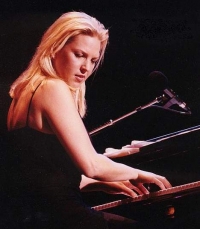
Diana Jean Krall, (born November 16, 1964) is a Canadian jazz pianist and singer.
Krall was born into a musical family in Nanaimo, British Columbia, Canada. She began learning the piano at the age of four. In high school, she started playing in a small jazz group. When she was 15 she started playing regularly in several Nanaimo restaurants.
At age seventeen she won a scholarship from the Vancouver International Jazz Festival to study at the Berklee College of Music in Boston, and completed three terms.
In Nanaimo her playing attracted the attention of famed bass player Ray Brown (ex-husband of the late Ella Fitzgerald, long-time member of the Oscar Peterson Trio and Grammy-winning composer) and drummer Jeff Hamilton. After hearing her play, Brown and Hamilton persuaded Krall to move to Los Angeles, and study with pianist Jimmy Rowles, with whom she began to sing. This also brought her into contact with influential teachers and producers. In 1990, Krall relocated to New York.
Krall was born into a musical family in Nanaimo, British Columbia, Canada. She began learning the piano at the age of four. In high school, she started playing in a small jazz group. When she was 15 she started playing regularly in several Nanaimo restaurants.
At age seventeen she won a scholarship from the Vancouver International Jazz Festival to study at the Berklee College of Music in Boston, and completed three terms.
In Nanaimo her playing attracted the attention of famed bass player Ray Brown (ex-husband of the late Ella Fitzgerald, long-time member of the Oscar Peterson Trio and Grammy-winning composer) and drummer Jeff Hamilton. After hearing her play, Brown and Hamilton persuaded Krall to move to Los Angeles, and study with pianist Jimmy Rowles, with whom she began to sing. This also brought her into contact with influential teachers and producers. In 1990, Krall relocated to New York.
Franz Schubert

Franz Peter Schubert (German pronunciation: ; January 31, 1797 – November 19, 1828) was an Austrian composer. He wrote some 600 Lieder, nine symphonies (including the famous "Unfinished Symphony"), liturgical music, operas, some incidental music, and a large body of chamber and solo piano music. He is particularly noted for his original melodic and harmonic writing.
Schubert was born into a musical family, and received formal musical training through much of his childhood. While Schubert had a close circle of friends and associates who admired his work (amongst them the prominent singer Johann Michael Vogl), wide appreciation of his music during his lifetime was limited at best. He was never able to secure adequate permanent employment, and for most of his career he relied on the support of friends and family. He made some money from published works, and occasionally gave private musical instruction. In the last year of his life he began to receive wider acclaim. He died at the age of 31 of "typhoid fever", a diagnosis which was vague at the time; several scholars suspect the real illness was tertiary syphilis.
Interest in Schubert's work increased dramatically in the decades following his death. Composers like Franz Liszt, Robert Schumann and Felix Mendelssohn discovered, collected, and championed his works in the 19th century, as did musicologist Sir George Grove. Franz Schubert is now widely considered to be one of the greatest composers in the Western tradition.
Schubert was born into a musical family, and received formal musical training through much of his childhood. While Schubert had a close circle of friends and associates who admired his work (amongst them the prominent singer Johann Michael Vogl), wide appreciation of his music during his lifetime was limited at best. He was never able to secure adequate permanent employment, and for most of his career he relied on the support of friends and family. He made some money from published works, and occasionally gave private musical instruction. In the last year of his life he began to receive wider acclaim. He died at the age of 31 of "typhoid fever", a diagnosis which was vague at the time; several scholars suspect the real illness was tertiary syphilis.
Interest in Schubert's work increased dramatically in the decades following his death. Composers like Franz Liszt, Robert Schumann and Felix Mendelssohn discovered, collected, and championed his works in the 19th century, as did musicologist Sir George Grove. Franz Schubert is now widely considered to be one of the greatest composers in the Western tradition.
The Beatles

The Beatles were a pop and rock group from Liverpool, England formed in 1960. Primarily consisting of John Lennon (rhythm guitar, vocals), Paul McCartney (bass guitar, vocals), George Harrison (lead guitar, vocals) and Ringo Starr (drums, vocals) throughout their career, The Beatles are recognised for leading the mid-1960s musical "British Invasion" into the United States. Although their initial musical style was rooted in 1950s rock and roll and homegrown skiffle, the group explored genres ranging from Tin Pan Alley to psychedelic rock. Their clothes, styles, and statements made them trend-setters, while their growing social awareness saw their influence extend into the social and cultural revolutions of the 1960s. After the band broke up in 1970, all four members embarked upon solo careers.
The Beatles are one of the most commercially successful and critically acclaimed bands in the history of popular music, selling over a billion records internationally. In the United Kingdom, The Beatles released more than 40 different singles, albums, and EPs that reached number one, earning more number one albums (15) than any other group in UK chart history. This commercial success was repeated in many other countries; their record company, EMI, estimated that by 1985 they had sold over one billion records worldwide. According to the Recording Industry Association of America, The Beatles have sold more albums in the United States than any other band. In 2004, Rolling Stone magazine ranked The Beatles number one on its list of 100 Greatest Artists of All Time. According to that same magazine, The Beatles' innovative music and cultural impact helped define the 1960s, and their influence on pop culture is still evident today. In 2008, Billboard magazine released a list of top-selling Hot 100 artists to celebrate the chart's fiftieth anniversary; The Beatles reached #1 again.
The Beatles are one of the most commercially successful and critically acclaimed bands in the history of popular music, selling over a billion records internationally. In the United Kingdom, The Beatles released more than 40 different singles, albums, and EPs that reached number one, earning more number one albums (15) than any other group in UK chart history. This commercial success was repeated in many other countries; their record company, EMI, estimated that by 1985 they had sold over one billion records worldwide. According to the Recording Industry Association of America, The Beatles have sold more albums in the United States than any other band. In 2004, Rolling Stone magazine ranked The Beatles number one on its list of 100 Greatest Artists of All Time. According to that same magazine, The Beatles' innovative music and cultural impact helped define the 1960s, and their influence on pop culture is still evident today. In 2008, Billboard magazine released a list of top-selling Hot 100 artists to celebrate the chart's fiftieth anniversary; The Beatles reached #1 again.
Moby
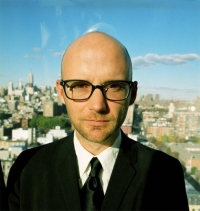
Richard Melville Hall, also known as Moby (born September 11, 1965 in Harlem, New York) is an American DJ, singer-songwriter and musician.
He plays keyboard, guitar, bass guitar and drums. After eight top 40 singles in the UK in the 1990s he released the album Play, in 1999, which sold 9 million copies worldwide. His follow up albums, 18, Hotel, and Last Night sold 6 million copies and have achieved gold and platinum status in over 30 countries.
He plays keyboard, guitar, bass guitar and drums. After eight top 40 singles in the UK in the 1990s he released the album Play, in 1999, which sold 9 million copies worldwide. His follow up albums, 18, Hotel, and Last Night sold 6 million copies and have achieved gold and platinum status in over 30 countries.
Michael Nyman
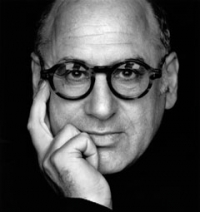
Michael Laurence Edward Nyman, CBE (born 23 March 1944, Stratford, London) is an English composer of minimalist music, pianist, librettist and musicologist, perhaps best known for the many movie scores he wrote during his lengthy collaboration with the filmmaker Peter Greenaway, and his multi-platinum soundtrack album to Jane Campion's The Piano. His operas include The Man Who Mistook His Wife for a Hat, Letters, Riddles and Writs, Noises, Sounds & Sweet Airs, Facing Goya, Man and Boy: Dada, Love Counts, and Sparkie: Cage and Beyond, and he has written six concerti, four string quartets, and many other chamber works, many for his Michael Nyman Band, with and without whom he tours as a performing pianist. Nyman has stated his preference for writing opera to other sorts of music. In 2008 Man On Wire was released, much of the film's soundtrack is derived from the 2006 album, The Composer's Cut Series Vol. II: Nyman/Greenaway Revisited.
Joseph Rheinberger
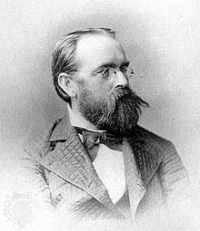
Josef Gabriel Rheinberger (17 March 1839, in Vaduz – 25 November 1901, in Munich) was a German organist and composer, born in Liechtenstein.
When only seven years old Rheinberger became organist at Vaduz Parish Church, and his first composition was performed the following year. In 1851 he entered the Munich Conservatory, where he later became professor of piano and subsequently professor of composition. When the Munich Conservatorium was dissolved he was appointed répétiteur at the Court Theatre, from which he resigned in 1867.
Rheinberger married his former pupil Franziska von Hoffnaass in 1867. He was influenced by painting and literature (especially English and German).
In 1877 Rheinberger obtained the rank of court conductor, a position that gave him responsibility for the music in the royal chapel. He was later awarded an honorary degree of Doctor of Philosophy by Ludwig Maximilian University of Munich. A distinguished teacher, he numbered many Americans among his pupils, including Horatio Parker, William Berwald, George Whitefield Chadwick, Bruno Klein, and Henry Holden Huss. When the present Conservatorium was founded in Munich, Rheinberger was appointed its professor of organ and composition, a post he held until his death. He was also given the title "Royal Professor".
Rheinberger was a prolific composer. His religious works include twelve masses (one for double chorus, three for four voices a cappella, three for women's voices and organ, two for men's voices and one with orchestra), a requiem, and a Stabat Mater. His other works include several operas, symphonies, chamber music, and choral works. Today he is remembered almost exclusively for his elaborate and challenging organ compositions; these include two concertos, 20 sonatas, 22 trios, 12 Meditations, 24 fughettos, and 36 solo pieces.
When only seven years old Rheinberger became organist at Vaduz Parish Church, and his first composition was performed the following year. In 1851 he entered the Munich Conservatory, where he later became professor of piano and subsequently professor of composition. When the Munich Conservatorium was dissolved he was appointed répétiteur at the Court Theatre, from which he resigned in 1867.
Rheinberger married his former pupil Franziska von Hoffnaass in 1867. He was influenced by painting and literature (especially English and German).
In 1877 Rheinberger obtained the rank of court conductor, a position that gave him responsibility for the music in the royal chapel. He was later awarded an honorary degree of Doctor of Philosophy by Ludwig Maximilian University of Munich. A distinguished teacher, he numbered many Americans among his pupils, including Horatio Parker, William Berwald, George Whitefield Chadwick, Bruno Klein, and Henry Holden Huss. When the present Conservatorium was founded in Munich, Rheinberger was appointed its professor of organ and composition, a post he held until his death. He was also given the title "Royal Professor".
Rheinberger was a prolific composer. His religious works include twelve masses (one for double chorus, three for four voices a cappella, three for women's voices and organ, two for men's voices and one with orchestra), a requiem, and a Stabat Mater. His other works include several operas, symphonies, chamber music, and choral works. Today he is remembered almost exclusively for his elaborate and challenging organ compositions; these include two concertos, 20 sonatas, 22 trios, 12 Meditations, 24 fughettos, and 36 solo pieces.
Puccini

Giacomo Antonio Domenico Michele Secondo Maria Puccini (December 22, 1858 – November 29, 1924) was an Italian composer whose operas, including La Bohème, Tosca, and Madama Butterfly, are among the most frequently performed in the standard repertoire. Some of his arias, such as "O Mio Babbino Caro" from Gianni Schicchi, "Che gelida manina" from La Bohème, and "Nessun Dorma" from Turandot, have become part of popular culture.
The subject of Puccini's style is one that has been long avoided by musicologists; this avoidance can perhaps be attributed to the perception that his work, with its emphasis on melody and evident popular appeal, lacked "seriousness" (a similar prejudice beset Rachmaninoff during his lifetime). Despite the place Puccini clearly occupies in the popular tradition of Verdi, his style of orchestration also shows the strong influence of Wagner, matching specific orchestral configurations and timbres to different dramatic moments. His operas contain an unparalleled manipulation of orchestral colors, with the orchestra often creating the scene’s atmosphere.
The structures of Puccini's works are also noteworthy. While it is to an extent possible to divide his operas into arias or numbers (like Verdi's), his scores generally present a very strong sense of continuous flow and connectivity, perhaps another sign of Wagner’s influence. Like Wagner, Puccini used leitmotifs to connote characters (or combinations of characters). This is apparent in Tosca, where the three chords which signal the beginning of the opera are used throughout to announce Scarpia. Several motifs are also linked to Mimi and the Bohemians in La Bohème and to Cio-Cio-San's eventual suicide in Butterfly. Unlike Wagner, though, Puccini's motifs are static: where Wagner's motifs develop into more complicated figures as the characters develop, Puccini's remain more or less identical throughout the opera (in this respect anticipating the themes of modern musical theatre).
The subject of Puccini's style is one that has been long avoided by musicologists; this avoidance can perhaps be attributed to the perception that his work, with its emphasis on melody and evident popular appeal, lacked "seriousness" (a similar prejudice beset Rachmaninoff during his lifetime). Despite the place Puccini clearly occupies in the popular tradition of Verdi, his style of orchestration also shows the strong influence of Wagner, matching specific orchestral configurations and timbres to different dramatic moments. His operas contain an unparalleled manipulation of orchestral colors, with the orchestra often creating the scene’s atmosphere.
The structures of Puccini's works are also noteworthy. While it is to an extent possible to divide his operas into arias or numbers (like Verdi's), his scores generally present a very strong sense of continuous flow and connectivity, perhaps another sign of Wagner’s influence. Like Wagner, Puccini used leitmotifs to connote characters (or combinations of characters). This is apparent in Tosca, where the three chords which signal the beginning of the opera are used throughout to announce Scarpia. Several motifs are also linked to Mimi and the Bohemians in La Bohème and to Cio-Cio-San's eventual suicide in Butterfly. Unlike Wagner, though, Puccini's motifs are static: where Wagner's motifs develop into more complicated figures as the characters develop, Puccini's remain more or less identical throughout the opera (in this respect anticipating the themes of modern musical theatre).
Adele

Adele Laurie Blue Adkins (born 5 May 1988 in Enfield, North London), She is the first recipient of the Brit Awards Critics' Choice, which was given to artists who, at the time, had yet to release an album. She debuted at number one with her Mercury Prize nominated debut album 19 in the UK album chart and has since then been certified platinum with sales over 500,000 copies.
Title Of Show

is a one-act musical, with music and lyrics by Jeff Bowen and a book by Hunter Bell. The show chronicles its own creation as an entry in the New York Musical Theatre Festival, and follows the struggles of the author and composer/lyricist and their two actress friends during the initial brief (three-week) creative period, along with subsequent events leading up to the show's production.
Stevie Wonder

Stevie Wonder (born Stevland Hardaway Judkins on May 13, 1950, name later changed to Stevland Hardaway Morris) is an American singer-songwriter, multi-instrumentalist, and record producer. A prominent figure in popular music during the latter half of the 20th century , Wonder has recorded more than thirty top ten hits, won 26 Grammy Awards (a record for a solo artist), plus one for lifetime achievement, won an Academy Award for Best Song and been inducted into both the Rock and Roll and Songwriters halls of fame. He has also been awarded the Polar Music Prize.
Blind from infancy, Wonder signed with Motown Records as a pre-adolescent at age twelve, and continues to perform and record for the label to this day. He has nine U.S. number-one hits to his name (on the pop Charts, 20 U.S. R&B number one hits), and album sales totaling more than 150 million units. Wonder has recorded several critically acclaimed albums and hit singles, and writes and produces songs for many of his label mates and outside artists as well. Wonder plays the piano, synthesizer, harmonica, congas, drums, bongos, organ, melodica, and clavinet. In his early career, he was best known for his harmonica work, but today he is better known for his keyboard skills and vocals.
Blind from infancy, Wonder signed with Motown Records as a pre-adolescent at age twelve, and continues to perform and record for the label to this day. He has nine U.S. number-one hits to his name (on the pop Charts, 20 U.S. R&B number one hits), and album sales totaling more than 150 million units. Wonder has recorded several critically acclaimed albums and hit singles, and writes and produces songs for many of his label mates and outside artists as well. Wonder plays the piano, synthesizer, harmonica, congas, drums, bongos, organ, melodica, and clavinet. In his early career, he was best known for his harmonica work, but today he is better known for his keyboard skills and vocals.
Handel

George Frideric Handel (Friday, 23 February 1685 - Saturday, 14 April 1759) was a German-born Baroque composer who is famous for his operas, oratorios and concerti grossi. Born as Georg Friedrich Handel in Halle, he spent most of his adult life in England, becoming a subject of the British crown on 22 January 1727. His most famous works are Messiah, an oratorio set to texts from the King James Bible; Water Music; and Music for the Royal Fireworks. Strongly influenced by the techniques of the great composers of the Italian Baroque and the English composer Henry Purcell, his music was known to many significant composers who came after him, including Haydn, Mozart, and Beethoven.
Handel's compositions include 42 operas; 29 oratorios; more than 120 cantatas, trios and duets; numerous arias; chamber music; a large number of ecumenical pieces; odes and serenatas; and sixteen organ concerti. His most famous work, the Messiah oratorio with its "Hallelujah" chorus, is among the most popular works in choral music and has become a centerpiece of the Christmas season. Also popular are the Opus 3 and 6 Concerti Grossi, as well as "The Cuckoo and the Nightingale", in which birds are heard calling during passages played in different keys representing the vocal ranges of two birds. Also notable are his sixteen keyboard suites, especially The Harmonious Blacksmith.
Handel introduced various previously uncommon musical instruments in his works: the viola d'amore and violetta marina (Orlando), the lute (Ode for St. Cecilia's Day), three trombones (Saul), clarinets or small high cornets (Tamerlano), theorbo, French horn (Water Music), lyrichord, double bassoon, viola da gamba, bell chimes, positive organ, and harp (Giulio Cesare, Alexander's Feast).
Handel's compositions include 42 operas; 29 oratorios; more than 120 cantatas, trios and duets; numerous arias; chamber music; a large number of ecumenical pieces; odes and serenatas; and sixteen organ concerti. His most famous work, the Messiah oratorio with its "Hallelujah" chorus, is among the most popular works in choral music and has become a centerpiece of the Christmas season. Also popular are the Opus 3 and 6 Concerti Grossi, as well as "The Cuckoo and the Nightingale", in which birds are heard calling during passages played in different keys representing the vocal ranges of two birds. Also notable are his sixteen keyboard suites, especially The Harmonious Blacksmith.
Handel introduced various previously uncommon musical instruments in his works: the viola d'amore and violetta marina (Orlando), the lute (Ode for St. Cecilia's Day), three trombones (Saul), clarinets or small high cornets (Tamerlano), theorbo, French horn (Water Music), lyrichord, double bassoon, viola da gamba, bell chimes, positive organ, and harp (Giulio Cesare, Alexander's Feast).
Gabriel Ma

Gabriel Ma. Opera Singer, Arts Administrator, and Choral Conductor. FreelanceIndiana University Jacobs School of Music. Hong Kong SAR500+ connections.
Taylor Swift

Taylor Alison Swift (born December 13, 1989) is an American country-pop singer-songwriter. In 2006, she released her debut single "Tim McGraw", which peaked at number six on the Billboard country charts. Later in October 2006, she released her self-titled debut album, which produced five hit singles on the Billboard Hot Country Songs charts and was certified 3× Multi-Platinum by the RIAA. The New York Times described Swift as "one of pop's finest songwriters, country’s foremost pragmatist and more in touch with her inner life than most adults".
According to Nielsen SoundScan, Swift was the biggest selling artist of 2008 in America with combined sales of more than four million albums. Swift's Fearless and her self-titled album finished 2008 at number three and number six respectively, with sales of 2.1 and 1.5 million. She was the first artist in the history of Nielsen SoundScan to have two different albums in the Top 10 on the year end album chart. Fearless has topped the Billboard 200 in 11 non-consecutive weeks. No album has spent more time at number one since 1999-2000. It also was the first album by a female artist in country music history to log eight weeks at #1 on The Billboard 200. In mid-January 2009, Swift became the first country artist to top the 2 million mark in paid downloads with three different songs. As of the week ending February 8, 2009, Swift's single "Love Story" became the country song with most paid downloads in history and the first country song to top the Mainstream Top 40 chart. According to the 2009 issue of Forbes, Swift is ranked as the 69th most powerful celebrity with over $18 million dollars in earnings this year.
According to Nielsen SoundScan, Swift was the biggest selling artist of 2008 in America with combined sales of more than four million albums. Swift's Fearless and her self-titled album finished 2008 at number three and number six respectively, with sales of 2.1 and 1.5 million. She was the first artist in the history of Nielsen SoundScan to have two different albums in the Top 10 on the year end album chart. Fearless has topped the Billboard 200 in 11 non-consecutive weeks. No album has spent more time at number one since 1999-2000. It also was the first album by a female artist in country music history to log eight weeks at #1 on The Billboard 200. In mid-January 2009, Swift became the first country artist to top the 2 million mark in paid downloads with three different songs. As of the week ending February 8, 2009, Swift's single "Love Story" became the country song with most paid downloads in history and the first country song to top the Mainstream Top 40 chart. According to the 2009 issue of Forbes, Swift is ranked as the 69th most powerful celebrity with over $18 million dollars in earnings this year.
Bach

Johann Sebastian Bach (31 March 1685 – 28 July 1750) was a German composer and organist whose sacred and secular works for choir, orchestra, and solo instruments drew together the strands of the Baroque period and brought it to its ultimate maturity. Although he introduced no new forms, he enriched the prevailing German style with a robust contrapuntal technique, an unrivalled control of harmonic and motivic organisation in composition for diverse musical forces, and the adaptation of rhythms and textures from abroad, particularly Italy and France.
Revered for their intellectual depth and technical and artistic beauty, Bach's works include the Brandenburg concertos; the Goldberg Variations; the English Suites, French Suites, Partitas, and Well-Tempered Clavier; the Mass in B Minor; the St. Matthew Passion; the St. John Passion; The Musical Offering; The Art of Fugue; the Sonatas and Partitas for violin solo; the Cello Suites; more than 200 surviving cantatas; and a similar number of organ works, including the celebrated Toccata and Fugue in D Minor.
While Bach's fame as an organist was great during his lifetime, he was not particularly well-known as a composer. His adherence to Baroque forms and contrapuntal style was considered "old-fashioned" by his contemporaries, especially late in his career when the musical fashion tended towards Rococo and later Classical styles. A revival of interest and performances of his music began early in the 19th century, and he is now widely considered to be one of the greatest composers in the Western tradition.
Revered for their intellectual depth and technical and artistic beauty, Bach's works include the Brandenburg concertos; the Goldberg Variations; the English Suites, French Suites, Partitas, and Well-Tempered Clavier; the Mass in B Minor; the St. Matthew Passion; the St. John Passion; The Musical Offering; The Art of Fugue; the Sonatas and Partitas for violin solo; the Cello Suites; more than 200 surviving cantatas; and a similar number of organ works, including the celebrated Toccata and Fugue in D Minor.
While Bach's fame as an organist was great during his lifetime, he was not particularly well-known as a composer. His adherence to Baroque forms and contrapuntal style was considered "old-fashioned" by his contemporaries, especially late in his career when the musical fashion tended towards Rococo and later Classical styles. A revival of interest and performances of his music began early in the 19th century, and he is now widely considered to be one of the greatest composers in the Western tradition.
Twilight
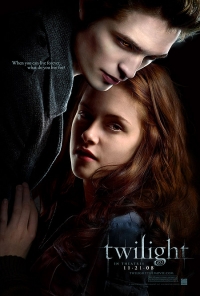
Twilight is a 2008 American romantic-fantasy film directed by Catherine Hardwicke and based on the novel of the same name by Stephenie Meyer. The protagonists of the film are Bella Swan and Edward Cullen, who are played by Kristen Stewart and Robert Pattinson, respectively. The premise focuses on a teenage girl and a vampire who fall in love.
The project was in development for approximately three years at Paramount Pictures before it was put into pre-production by Summit Entertainment. The novel was adapted for the screen by Melissa Rosenberg in late 2007, shortly before the 2007–2008 Writers Guild of America strike. The film was primarily shot in Washington and Oregon in early 2008. Twilight was released in theaters on November 21, 2008, and grossed US$35.7 million on its opening day. As of May 30, 2009, the film has grossed US$382,133,300 in worldwide box office and $148,771,132 in North American DVD sales. The soundtrack was released on November 4, 2008.
The project was in development for approximately three years at Paramount Pictures before it was put into pre-production by Summit Entertainment. The novel was adapted for the screen by Melissa Rosenberg in late 2007, shortly before the 2007–2008 Writers Guild of America strike. The film was primarily shot in Washington and Oregon in early 2008. Twilight was released in theaters on November 21, 2008, and grossed US$35.7 million on its opening day. As of May 30, 2009, the film has grossed US$382,133,300 in worldwide box office and $148,771,132 in North American DVD sales. The soundtrack was released on November 4, 2008.
Beyonce

Beyoncé Giselle Knowles (born September 4, 1981), commonly known as Beyoncé, is an American R&B singer-songwriter, record producer, and actress. Born and raised in Houston, Texas, she enrolled in various performing arts schools, and was first exposed to singing and dancing competitions as a child. Knowles rose to fame in the late 1990s as the lead singer of R&B girl group Destiny's Child, the best-selling girl group of all time.
In June 2003, after a series of commercial successes with the group, Beyoncé released her debut solo album, Dangerously in Love. The album became one of the most successful albums of that year, spawning the number-one singles "Crazy in Love" and "Baby Boy", and earned Knowles five Grammy Awards in a single night in 2004. The formal disbandment of Destiny's Child in 2005 facilitated her continued success as a solo artist. She released her second album, B'Day in 2006, which spawned the UK number-one singles "Déjà Vu" and "Beautiful Liar", as well as the worldwide hit, "Irreplaceable". Knowles has sold 15 million albums and singles worldwide.
The success of her solo albums has established her as one of the most marketable artists in the industry. However, she has also added acting and endorsement deals to her repertoire. In 2006, she starred alongside Steve Martin and Kevin Kline in the comedy The Pink Panther, and that same year, scored the main role in the film adaptation of the 1981 Broadway musical Dreamgirls, which earned her a Golden Globe nomination. Knowles launched her family's fashion line House of Deréon in 2004, and among her many lucrative commercial deals are Pepsi, Tommy Hilfiger, and L'Oréal. Knowles has been with long-time boyfriend Jay-Z since 2002, though they have been discreet about their relationship. After much speculation, they married on April 4, 2008.
In June 2003, after a series of commercial successes with the group, Beyoncé released her debut solo album, Dangerously in Love. The album became one of the most successful albums of that year, spawning the number-one singles "Crazy in Love" and "Baby Boy", and earned Knowles five Grammy Awards in a single night in 2004. The formal disbandment of Destiny's Child in 2005 facilitated her continued success as a solo artist. She released her second album, B'Day in 2006, which spawned the UK number-one singles "Déjà Vu" and "Beautiful Liar", as well as the worldwide hit, "Irreplaceable". Knowles has sold 15 million albums and singles worldwide.
The success of her solo albums has established her as one of the most marketable artists in the industry. However, she has also added acting and endorsement deals to her repertoire. In 2006, she starred alongside Steve Martin and Kevin Kline in the comedy The Pink Panther, and that same year, scored the main role in the film adaptation of the 1981 Broadway musical Dreamgirls, which earned her a Golden Globe nomination. Knowles launched her family's fashion line House of Deréon in 2004, and among her many lucrative commercial deals are Pepsi, Tommy Hilfiger, and L'Oréal. Knowles has been with long-time boyfriend Jay-Z since 2002, though they have been discreet about their relationship. After much speculation, they married on April 4, 2008.
Michelle Branch

Michelle Jacquet Branch-Landau (born July 2, 1983) is an American singer, songwriter and guitarist. She made her debut in 2000, and released the platinum-selling albums The Spirit Room and Hotel Paper in August 2001 and June 2003 respectively. During this period, she collaborated with Santana on the single "The Game of Love", which won a Grammy Award. In 2004, she formed the musical duo The Wreckers with fellow musician Jessica Harp. Michelle Branch will release her first solo album with Warner Bros. Nashville, Everything Comes and Goes, in February 2009.
Franz Liszt

Franz Liszt (Hungarian: Ferencz Liszt, in modern usage Ferenc Liszt, from 1859 to 1865 officially Franz Ritter von Liszt) (October 22, 1811 – July 31, 1886) was a Hungarian composer, virtuoso pianist and teacher. He was also the father-in-law of Richard Wagner. In 1865 he became abbot in the Roman Catholic Church.
Liszt became renowned throughout Europe during the 19th century for his great skill as a performer. He was said by his contemporaries to have been the most technically advanced pianist of his age and perhaps the greatest pianist of all time. He was also an important and influential composer, a notable piano teacher, a conductor who contributed significantly to the modern development of the art, and a benefactor to other composers and performers, notably Richard Wagner, Hector Berlioz, Camille Saint-Saëns, Edvard Grieg and Alexander Borodin.
As a composer, Liszt was one of the most prominent representatives of the "Neudeutsche Schule" ("New German School"). He left behind a huge and diverse body of work, in which he influenced his forward-looking contemporaries and anticipated some 20th-century ideas and trends. Some of his most notable contributions were the invention of the symphonic poem, developing the concept of thematic transformation as part of his experiments in musical form and making radical departures in harmony.
Liszt became renowned throughout Europe during the 19th century for his great skill as a performer. He was said by his contemporaries to have been the most technically advanced pianist of his age and perhaps the greatest pianist of all time. He was also an important and influential composer, a notable piano teacher, a conductor who contributed significantly to the modern development of the art, and a benefactor to other composers and performers, notably Richard Wagner, Hector Berlioz, Camille Saint-Saëns, Edvard Grieg and Alexander Borodin.
As a composer, Liszt was one of the most prominent representatives of the "Neudeutsche Schule" ("New German School"). He left behind a huge and diverse body of work, in which he influenced his forward-looking contemporaries and anticipated some 20th-century ideas and trends. Some of his most notable contributions were the invention of the symphonic poem, developing the concept of thematic transformation as part of his experiments in musical form and making radical departures in harmony.
Bruno Mars

Peter Gene Hernandez (born October 8, 1985), better known by his stage name Bruno Mars, is an American singer-songwriter and music producer. Raised in Honolulu, Hawaii by a family of musicians, Mars began making music at a young age. After performing in various musical venues in his hometown throughout his childhood, he decided to pursue a musical career. Mars began producing songs for other artists, joining production team The Smeezingtons.
He became recognized as a solo artist after lending his vocals and co-writing the hooks for the songs "Nothin' on You" by B.o.B, and "Billionaire" by Travie McCoy. He also co-wrote the hits "Right Round" by Flo Rida featuring Kesha, "Wavin' Flag" by K'naan, and "Fuck You!" by Cee Lo Green. In October 2010, he released his debut album, Doo-Wops & Hooligans. Anchored by the singles "Just the Way You Are" and "Grenade", the album peaked at number three on the Billboard 200. He has been nominated for seven Grammys at the 53rd Grammy Awards, which will be held on February 13, 2011.
He became recognized as a solo artist after lending his vocals and co-writing the hooks for the songs "Nothin' on You" by B.o.B, and "Billionaire" by Travie McCoy. He also co-wrote the hits "Right Round" by Flo Rida featuring Kesha, "Wavin' Flag" by K'naan, and "Fuck You!" by Cee Lo Green. In October 2010, he released his debut album, Doo-Wops & Hooligans. Anchored by the singles "Just the Way You Are" and "Grenade", the album peaked at number three on the Billboard 200. He has been nominated for seven Grammys at the 53rd Grammy Awards, which will be held on February 13, 2011.
Metallica

Metallica is an American heavy metal band that formed in 1981 in Los Angeles, California. Founded when drummer Lars Ulrich posted an advertisement in a Los Angeles newspaper, Metallica's original line-up consisted of Ulrich, rhythm guitarist and vocalist James Hetfield, lead guitarist Dave Mustaine, and bassist Ron McGovney. These last two were later replaced from the band, in favor of Kirk Hammett and Cliff Burton, respectively. In September 1986, Metallica's tour bus skidded out of control and flipped, which resulted in Burton being crushed under the bus and killed. Jason Newsted replaced him less than two months later. Newsted left the band in 2001 and was replaced by Robert Trujillo in 2003.
Metallica's early releases included fast tempos, instrumentals, and aggressive musicianship that placed them as one of the "Big Four" of the thrash metal subgenre alongside Slayer, Megadeth and Anthrax. The band earned a growing fan base in the underground music community, and some critics say the 1986 release Master of Puppets is one of the most influential and "heavy" thrash metal albums. The band achieved substantial commercial success with its self-titled 1991 album, which debuted at number one on the Billboard 200. Some critics and fans believed the band changed its musical direction to appeal to the mainstream audience. With the release of Load in 1996, Metallica distanced itself from earlier releases in what has been described as "an almost alternative rock approach", and the band faced accusations of "selling out".
In 2000, Metallica was among several artists who filed a lawsuit against Napster for sharing the band's copyright-protected material for free without the band members' consent. A settlement was reached, and Napster became a pay-to-use service. Despite reaching number one on the Billboard 200, the release of St. Anger in 2003 disappointed some critics and fans with the exclusion of guitar solos, and the "steel-sounding" snare drum. A film titled Some Kind of Monster documented the recording process of St. Anger.
Metallica's early releases included fast tempos, instrumentals, and aggressive musicianship that placed them as one of the "Big Four" of the thrash metal subgenre alongside Slayer, Megadeth and Anthrax. The band earned a growing fan base in the underground music community, and some critics say the 1986 release Master of Puppets is one of the most influential and "heavy" thrash metal albums. The band achieved substantial commercial success with its self-titled 1991 album, which debuted at number one on the Billboard 200. Some critics and fans believed the band changed its musical direction to appeal to the mainstream audience. With the release of Load in 1996, Metallica distanced itself from earlier releases in what has been described as "an almost alternative rock approach", and the band faced accusations of "selling out".
In 2000, Metallica was among several artists who filed a lawsuit against Napster for sharing the band's copyright-protected material for free without the band members' consent. A settlement was reached, and Napster became a pay-to-use service. Despite reaching number one on the Billboard 200, the release of St. Anger in 2003 disappointed some critics and fans with the exclusion of guitar solos, and the "steel-sounding" snare drum. A film titled Some Kind of Monster documented the recording process of St. Anger.
Neil Young

Neil Percival Young OM (born November 12, 1945, Toronto, Ontario) is a Canadian singer-songwriter, musician and film director.
Young's work is characterized by deeply personal lyrics, distinctive guitar work, and signature nasal tenor singing voice. Although he accompanies himself on several different instruments—including piano and harmonica—his style of claw-hammer acoustic guitar and often idiosyncratic soloing on electric guitar are the linchpins of a sometimes ragged, sometimes polished sound. Although Young has experimented widely with differing music styles, including swing, jazz, rockabilly, blues, and electronic music throughout a varied career, his best known work usually falls into either of two distinct styles: folk-esque acoustic rock (as heard in songs such as "Heart of Gold", "Harvest Moon" and "Old Man") and electric-charged hard rock (in songs like "Cinnamon Girl", "Rockin' in the Free World" and "Hey Hey, My My (Into the Black)"). In more recent years, Young has started to adopt elements from newer styles of music, such as industrial, alternative country and grunge, the latter of which was profoundly influenced by his own style of playing, causing some to confer on him the title of "the godfather of grunge".
Young has directed (or co-directed) a number of films using the pseudonym Bernard Shakey, including Journey Through the Past (1973), Rust Never Sleeps (1979), Human Highway (1982), and Greendale (2003).
He is also an outspoken advocate for environmental issues and small farmers, having co-founded in 1985 the benefit concert Farm Aid, and in 1986 helped found The Bridge School, and its annual supporting Bridge School Benefit concerts, together with his wife Pegi.
Young's work is characterized by deeply personal lyrics, distinctive guitar work, and signature nasal tenor singing voice. Although he accompanies himself on several different instruments—including piano and harmonica—his style of claw-hammer acoustic guitar and often idiosyncratic soloing on electric guitar are the linchpins of a sometimes ragged, sometimes polished sound. Although Young has experimented widely with differing music styles, including swing, jazz, rockabilly, blues, and electronic music throughout a varied career, his best known work usually falls into either of two distinct styles: folk-esque acoustic rock (as heard in songs such as "Heart of Gold", "Harvest Moon" and "Old Man") and electric-charged hard rock (in songs like "Cinnamon Girl", "Rockin' in the Free World" and "Hey Hey, My My (Into the Black)"). In more recent years, Young has started to adopt elements from newer styles of music, such as industrial, alternative country and grunge, the latter of which was profoundly influenced by his own style of playing, causing some to confer on him the title of "the godfather of grunge".
Young has directed (or co-directed) a number of films using the pseudonym Bernard Shakey, including Journey Through the Past (1973), Rust Never Sleeps (1979), Human Highway (1982), and Greendale (2003).
He is also an outspoken advocate for environmental issues and small farmers, having co-founded in 1985 the benefit concert Farm Aid, and in 1986 helped found The Bridge School, and its annual supporting Bridge School Benefit concerts, together with his wife Pegi.
Bach, J.S.
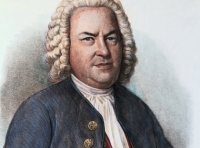
Johann Sebastian Bach (31 March 1685 – 28 July 1750) was a German composer and musician of the Baroque period. He is known for instrumental compositions such as the Art of Fugue, the Brandenburg Concertos, and the Goldberg Variations, and for vocal music such as the St Matthew Passion and the Mass in B minor. Since the 19th-century Bach Revival he has been generally regarded as one of the greatest composers of the Western art musical canon.
The Bach family already counted several composers when Johann Sebastian was born as the last child of a city musician in Eisenach. After being orphaned at age 10, he lived for five years with his eldest brother Johann Christoph Bach, after which he continued his musical development in Lüneburg. From 1703 he was back in Thuringia, working as a musician for Protestant churches in Arnstadt and Mühlhausen and, for longer stretches of time, at courts in Weimar, where he expanded his organ repertory, and Köthen, where he was mostly engaged with chamber music. From 1723 he was employed as Thomaskantor (cantor at St. Thomas) in Leipzig. He composed music for the principal Lutheran churches of the city, and for its university's student ensemble Collegium Musicum. From 1726 he published some of his keyboard music. In Leipzig, as had happened during some of his earlier positions, he had difficult relations with his employer, a situation that was little remedied when he was granted the title of court composer by his sovereign, Augustus, Elector of Saxony and King of Poland, in 1736. In the last decades of his life he reworked and extended many of his earlier compositions. He died of complications after eye surgery in 1750 at the age of 65.
The Bach family already counted several composers when Johann Sebastian was born as the last child of a city musician in Eisenach. After being orphaned at age 10, he lived for five years with his eldest brother Johann Christoph Bach, after which he continued his musical development in Lüneburg. From 1703 he was back in Thuringia, working as a musician for Protestant churches in Arnstadt and Mühlhausen and, for longer stretches of time, at courts in Weimar, where he expanded his organ repertory, and Köthen, where he was mostly engaged with chamber music. From 1723 he was employed as Thomaskantor (cantor at St. Thomas) in Leipzig. He composed music for the principal Lutheran churches of the city, and for its university's student ensemble Collegium Musicum. From 1726 he published some of his keyboard music. In Leipzig, as had happened during some of his earlier positions, he had difficult relations with his employer, a situation that was little remedied when he was granted the title of court composer by his sovereign, Augustus, Elector of Saxony and King of Poland, in 1736. In the last decades of his life he reworked and extended many of his earlier compositions. He died of complications after eye surgery in 1750 at the age of 65.
Nicolo paganini
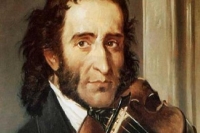
Niccolò Paganini, Italian composer, violin virtuoso guitarist and composer. He is one of the most famous violin virtuosos in music history. He has made important contributions to the violin technique and has given many works in the field of violin, guitar and chamber music.
Kiss
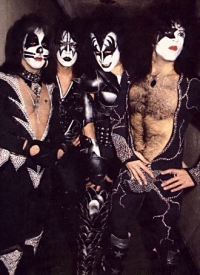
Kiss (also typeset as KISS) is an American rock band formed in New York City in December 1972. Easily identified by its members' trademark face paint and stage outfits, the group rose to prominence in the mid-1970s on the basis of their elaborate live performances, which featured fire-breathing, blood spitting, smoking guitars, and pyrotechnics. Kiss has been awarded 24 gold albums to date. The group's worldwide sales exceed 100 million albums.
The original lineup of Paul Stanley (vocals and rhythm guitar), Gene Simmons (vocals and bass guitar), Ace Frehley (lead guitar and vocals), and Peter Criss (drums, percussion and vocals) is the most successful and identifiable. With their makeup and costumes, they took on the personae of comic book-style characters: The Demon (Simmons), Starchild (Stanley), Spaceman (Frehley), and The Catman (Criss). The band explains that the fans were the ones who ultimately chose their makeup designs. The "Demon" makeup reflected Gene's cynicism and dark elements, as well as his love for comic books. Paul Stanley became the "Starchild" due to his tendency to be referred to as the "starry-eyed lover" and "hopeless romantic." Ace Frehley's "Spaceman" makeup was a reflection of him wanting to go for a ride in a space ship and supposedly being from another planet. Peter Criss' "Catman" makeup was in accordance with the belief that Peter had nine lives due to his rough childhood in Brooklyn. Due to creative differences, both Criss and Frehley were out of the group by 1982. The band's commercial fortunes had also waned considerably by that point.
In 1983, Kiss abandoned its makeup and enjoyed a commercial resurgence throughout the rest of the decade. Buoyed by a wave of Kiss nostalgia in the 1990s, the band announced a reunion of the original lineup (with makeup) in 1996. The resulting Kiss Alive/Worldwide/Lost Cities/Reunion Tour was the top-grossing act of 1996 and 1997. Criss and Frehley have since left Kiss again and have been replaced by Eric Singer and Tommy Thayer, respectively. The band continues to perform with makeup, while Stanley and Simmons have remained the only two constant members.
The original lineup of Paul Stanley (vocals and rhythm guitar), Gene Simmons (vocals and bass guitar), Ace Frehley (lead guitar and vocals), and Peter Criss (drums, percussion and vocals) is the most successful and identifiable. With their makeup and costumes, they took on the personae of comic book-style characters: The Demon (Simmons), Starchild (Stanley), Spaceman (Frehley), and The Catman (Criss). The band explains that the fans were the ones who ultimately chose their makeup designs. The "Demon" makeup reflected Gene's cynicism and dark elements, as well as his love for comic books. Paul Stanley became the "Starchild" due to his tendency to be referred to as the "starry-eyed lover" and "hopeless romantic." Ace Frehley's "Spaceman" makeup was a reflection of him wanting to go for a ride in a space ship and supposedly being from another planet. Peter Criss' "Catman" makeup was in accordance with the belief that Peter had nine lives due to his rough childhood in Brooklyn. Due to creative differences, both Criss and Frehley were out of the group by 1982. The band's commercial fortunes had also waned considerably by that point.
In 1983, Kiss abandoned its makeup and enjoyed a commercial resurgence throughout the rest of the decade. Buoyed by a wave of Kiss nostalgia in the 1990s, the band announced a reunion of the original lineup (with makeup) in 1996. The resulting Kiss Alive/Worldwide/Lost Cities/Reunion Tour was the top-grossing act of 1996 and 1997. Criss and Frehley have since left Kiss again and have been replaced by Eric Singer and Tommy Thayer, respectively. The band continues to perform with makeup, while Stanley and Simmons have remained the only two constant members.
Oliver!
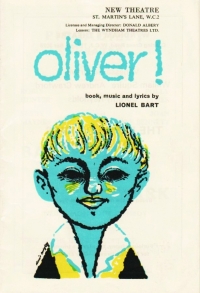
Oliver! is a British musical, with music and lyrics by Lionel Bart. It first appeared in the West End in 1960, enjoying a long run, and was made into a film directed by Carol Reed in 1968.
The musical is loosely based upon the novel Oliver Twist by Charles Dickens. That it was the first musical adaptation of a Charles Dickens work to become a stage hit was one of the reasons why it attracted such attention. There had been two previous Dickens musicals in the 1950s, both of them television adaptations of A Christmas Carol, but the dramatic story of Oliver Twist was the first Dickens work to be presented as a successful stage musical. Another reason for the success of the musical was the revolving stage set, an innovation designed by Sean Kenny.
The show launched the careers of several child actors, including Davy Jones, later of The Monkees; Phil Collins, later of Genesis; and Tony Robinson, who later played the role of Baldrick in the television series Black Adder. The singer Steve Marriott (Small Faces, Humble Pie) also featured in early line-ups, eventually graduating to the role of Artful Dodger in the West End production.
The plot of Dickens's original novel is considerably simplified for the purposes of the musical, with Fagin being represented more as a comic character than as a villain, and large portions of the latter part of the story being completely left out. Although Dickens' novel has been called antisemitic in its portrayal of the Jew Fagin as evil, the production by Bart (himself a Jew) featured many Jewish actors in leading roles: Ron Moody (Ronald Moodnik), Georgia Brown (Lilian Klot), and Martin Horsey.
The musical is loosely based upon the novel Oliver Twist by Charles Dickens. That it was the first musical adaptation of a Charles Dickens work to become a stage hit was one of the reasons why it attracted such attention. There had been two previous Dickens musicals in the 1950s, both of them television adaptations of A Christmas Carol, but the dramatic story of Oliver Twist was the first Dickens work to be presented as a successful stage musical. Another reason for the success of the musical was the revolving stage set, an innovation designed by Sean Kenny.
The show launched the careers of several child actors, including Davy Jones, later of The Monkees; Phil Collins, later of Genesis; and Tony Robinson, who later played the role of Baldrick in the television series Black Adder. The singer Steve Marriott (Small Faces, Humble Pie) also featured in early line-ups, eventually graduating to the role of Artful Dodger in the West End production.
The plot of Dickens's original novel is considerably simplified for the purposes of the musical, with Fagin being represented more as a comic character than as a villain, and large portions of the latter part of the story being completely left out. Although Dickens' novel has been called antisemitic in its portrayal of the Jew Fagin as evil, the production by Bart (himself a Jew) featured many Jewish actors in leading roles: Ron Moody (Ronald Moodnik), Georgia Brown (Lilian Klot), and Martin Horsey.
Gabriel Faure

Gabriel Urbain Fauré (12 May 1845 – 4 November 1924) was a French composer, organist, pianist, and teacher. He was the foremost French composer of his generation, and his musical style influenced many 20th century composers. His harmonic and melodic language affected how harmony was later taught.
The King and I
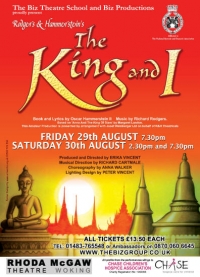
The King and I is a musical by Richard Rodgers and Oscar Hammerstein II. Its script is based on the book Anna and the King of Siam by Margaret Landon. The plot comes from the story written by Anna Leonowens, who became school teacher to the children of King Mongkut of Siam in the early 1860s. Leonowens' story, The English Governess at the Siamese Court, was autobiographical, although its objective accuracy is questionable; in Thailand, the possession of anything related to Anna and the King of Siam or The King and I is illegal, because of the historical inaccuracies about the King of Siam.
The musical opened on Broadway in 1951 and was the sixth collaboration for the team of Rodgers and Hammerstein. It ran for 1,246 performances, winning the Tony Award for Best Musical, among other awards. It spawned numerous revivals and a popular 1956 film version.
The best-known songs from the musical are probably "I Whistle a Happy Tune," "Getting to Know You," "Hello, Young Lovers," and "Shall We Dance?" The most colorful number in the musical, visually (to Western audiences), is the ballet "Small House of Uncle Thomas," choreographed by Jerome Robbins.
Rodgers and Hammerstein knew they were writing for stars — Gertrude Lawrence and Yul Brynner, the original Broadway leads — who were primarily actors rather than singers. Therefore, they reserved the sweeping, more challenging melodies for the characters of Tuptim and Lun Tha and kept the songs sung by the other leads simple.
Mary Martin, who had starred in South Pacific by Rodgers and Hammerstein a few years previously, was an investor in The King and I. When Gertrude Lawrence wanted to have a song with the children, Martin suggested that Rodgers and Hammerstein write new lyrics for "Suddenly Lovely," which had been cut out from South Pacific. The song then became "Getting to Know You."
The musical opened on Broadway in 1951 and was the sixth collaboration for the team of Rodgers and Hammerstein. It ran for 1,246 performances, winning the Tony Award for Best Musical, among other awards. It spawned numerous revivals and a popular 1956 film version.
The best-known songs from the musical are probably "I Whistle a Happy Tune," "Getting to Know You," "Hello, Young Lovers," and "Shall We Dance?" The most colorful number in the musical, visually (to Western audiences), is the ballet "Small House of Uncle Thomas," choreographed by Jerome Robbins.
Rodgers and Hammerstein knew they were writing for stars — Gertrude Lawrence and Yul Brynner, the original Broadway leads — who were primarily actors rather than singers. Therefore, they reserved the sweeping, more challenging melodies for the characters of Tuptim and Lun Tha and kept the songs sung by the other leads simple.
Mary Martin, who had starred in South Pacific by Rodgers and Hammerstein a few years previously, was an investor in The King and I. When Gertrude Lawrence wanted to have a song with the children, Martin suggested that Rodgers and Hammerstein write new lyrics for "Suddenly Lovely," which had been cut out from South Pacific. The song then became "Getting to Know You."
Koji Kondo

Koji Kondo (近藤浩治 Kondō Kōji?, born August 13, 1960) is a Japanese video game composer and sound director who has been employed at Nintendo since 1984. He is best known for scoring numerous titles in the Mario and The Legend of Zelda series.
Ayumi Hamasaki

Ayumi Hamasaki (born October 2, 1978), is a Japanese singer-songwriter and former actress. Also known as Ayu to her fans, Hamasaki has been dubbed the "Empress of pop" and "the Empress of J-Pop" due to her popularity and widespread influence in Japan. Born and raised in Fukuoka, she moved to Tokyo at fourteen to pursue a career in entertainment. In 1998, under the tutelage of Avex CEO Max Matsuura, she released a string of modestly selling singles that concluded with her 1999 debut album A Song for XX, which debuted atop the Oricon charts and stayed there for four weeks in a row, establishing her popularity in Japan.
Because of her constantly changing image and tight control over her artistry, Hamasaki has become a "trendsetter" and an "icon of fashion" in Asia; her popularity and influence in music and fashion extend to China, Singapore, Taiwan, and South Korea. She has appeared in or lent her songs to many advertisements and television commercials. Though she originally supported this, a 2001 event in which Avex forced her to put her greatest hits album in direct competition with Hikaru Utada's Distance made Hamasaki reconsider and eventually oppose her status as an Avex "product".
Since her 1998 debut with the single "Poker Face", Hamasaki has sold around 50 million records, making her one of Japan's best-selling singers.
Because of her constantly changing image and tight control over her artistry, Hamasaki has become a "trendsetter" and an "icon of fashion" in Asia; her popularity and influence in music and fashion extend to China, Singapore, Taiwan, and South Korea. She has appeared in or lent her songs to many advertisements and television commercials. Though she originally supported this, a 2001 event in which Avex forced her to put her greatest hits album in direct competition with Hikaru Utada's Distance made Hamasaki reconsider and eventually oppose her status as an Avex "product".
Since her 1998 debut with the single "Poker Face", Hamasaki has sold around 50 million records, making her one of Japan's best-selling singers.
W.A. Mozart

Wolfgang Amadeus Mozart (German: , full baptismal name Johannes Chrysostomus Wolfgangus Theophilus Mozart (27 January 1756 – 5 December 1791), was a prolific and influential composer of the Classical era. He composed over 600 works, many acknowledged as pinnacles of symphonic, concertante, chamber, piano, operatic, and choral music. He is among the most enduringly popular of classical composers.
Mozart showed prodigious ability from his earliest childhood in Salzburg. Already competent on keyboard and violin, he composed from the age of five and performed before European royalty; at 17 he was engaged as a court musician in Salzburg, but grew restless and traveled in search of a better position, always composing abundantly. While visiting Vienna in 1781, he was dismissed from his Salzburg position. He chose to stay in the capital, where he achieved fame but little financial security. During his final years in Vienna, he composed many of his best-known symphonies, concertos, and operas, and the Requiem. The circumstances of his early death have been much mythologized. He was survived by his wife Constanze and two sons.
Mozart learned voraciously from others, and developed a brilliance and maturity of style that encompassed the light and graceful along with the dark and passionate—the whole informed by a vision of humanity "redeemed through art, forgiven, and reconciled with nature and the absolute." His influence on subsequent Western art music is profound. Beethoven wrote his own early compositions in the shadow of Mozart, of whom Joseph Haydn wrote that "posterity will not see such a talent again in 100 years."
Mozart showed prodigious ability from his earliest childhood in Salzburg. Already competent on keyboard and violin, he composed from the age of five and performed before European royalty; at 17 he was engaged as a court musician in Salzburg, but grew restless and traveled in search of a better position, always composing abundantly. While visiting Vienna in 1781, he was dismissed from his Salzburg position. He chose to stay in the capital, where he achieved fame but little financial security. During his final years in Vienna, he composed many of his best-known symphonies, concertos, and operas, and the Requiem. The circumstances of his early death have been much mythologized. He was survived by his wife Constanze and two sons.
Mozart learned voraciously from others, and developed a brilliance and maturity of style that encompassed the light and graceful along with the dark and passionate—the whole informed by a vision of humanity "redeemed through art, forgiven, and reconciled with nature and the absolute." His influence on subsequent Western art music is profound. Beethoven wrote his own early compositions in the shadow of Mozart, of whom Joseph Haydn wrote that "posterity will not see such a talent again in 100 years."
Bill Evans
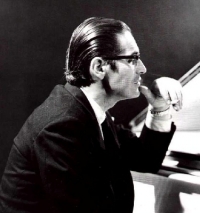
William John Evans, known as Bill Evans (August 16, 1929 – September 15, 1980) was an American jazz pianist. His use of impressionist harmony, inventive interpretation of traditional jazz repertoire, and trademark rhythmically independent, "singing" melodic lines influenced a generation of pianists, including Chick Corea, Herbie Hancock, John Taylor, Steve Kuhn, Don Friedman, Denny Zeitlin, Bobo Stenson and Keith Jarrett, as well as guitarists Lenny Breau and Pat Metheny. The music of Bill Evans continues to inspire younger pianists like Marcin Wasilewski, Fred Hersch, Ray Reach, Bill Charlap, Lyle Mays, Eliane Elias and arguably Brad Mehldau, early in his career.
Evans is an inductee of the Down Beat Jazz Hall of Fame.
Evans is an inductee of the Down Beat Jazz Hall of Fame.
Aida

Aida is a musical drama in two acts based on Giuseppe Verdi's Italian-language opera by the same name, which is based on a story by Auguste Mariette which is based on Shakespeare's Romeo and Juliet. The musical was produced by Hyperion Theatricals, a unit within Disney Theatrical, with music by Elton John, lyrics by Tim Rice, and book by Linda Woolverton, Robert Falls, and David Henry Hwang.
Elaborate Lives: The Legend of Aida had its world premiere at the Alliance Theatre in Atlanta, Georgia with the production running from September 16 to November 8, 1998. A new, revised production opened on November 12, 1999 at the Cadillac Palace in Chicago. The Broadway production, titled Elton John and Tim Rice's Aida, ran at the Palace Theatre from March 23, 2000 to September 4, 2004 for a total of 1,852 performances (and 30 previews). There was also produced a national tour and several international productions. Aida has recently become popular among school and community theaters. Licensing of these amateur productions of Aida is through Music Theatre International.
Elaborate Lives: The Legend of Aida had its world premiere at the Alliance Theatre in Atlanta, Georgia with the production running from September 16 to November 8, 1998. A new, revised production opened on November 12, 1999 at the Cadillac Palace in Chicago. The Broadway production, titled Elton John and Tim Rice's Aida, ran at the Palace Theatre from March 23, 2000 to September 4, 2004 for a total of 1,852 performances (and 30 previews). There was also produced a national tour and several international productions. Aida has recently become popular among school and community theaters. Licensing of these amateur productions of Aida is through Music Theatre International.
Tchaikovsky

Pyotr Il'yich Tchaikovsky (May 7 1840 â November 6 1893) was a Russian composer of the Romantic era. While not part of the nationalistic music group known as "The Five", Tchaikovsky wrote music which, in the opinion of Harold Schonberg, was distinctly Russian: plangent, introspective, with modally-inflected melody and harmony.
Aesthetically, Tchaikovsky remained open to all aspects of Saint Petersburg musical life. He was impressed by Serov and Balakirev as well as the classical values upheld by the conservatory. Both the progressive and conservative camps in Russian music at the time attempted to win him over. Tchaikovsky charted his compositional course between these two factions, retaining his individuality as a composer as well as his Russian identity. In this he was influenced by the ideals of his teacher Nikolai Rubinstein and Nikolai's brother Anton.
Tchaikovsky's musical cosmopolitanism led him to be favored by many Russian music-lovers over the "Russian" harmonies and styles of Mussorgsky, Borodin and Rimsky-Korsakov.
Nonetheless he frequently adapted Russian traditional melodies and dance forms in his music, which enhanced his success in his home country. The success in St. Petersburg at the premiere of his Third Orchestral Suite may have been due in large part to his concluding the work with a polonaise. He also used a polonaise for the final movement of his Third Symphony.
Aesthetically, Tchaikovsky remained open to all aspects of Saint Petersburg musical life. He was impressed by Serov and Balakirev as well as the classical values upheld by the conservatory. Both the progressive and conservative camps in Russian music at the time attempted to win him over. Tchaikovsky charted his compositional course between these two factions, retaining his individuality as a composer as well as his Russian identity. In this he was influenced by the ideals of his teacher Nikolai Rubinstein and Nikolai's brother Anton.
Tchaikovsky's musical cosmopolitanism led him to be favored by many Russian music-lovers over the "Russian" harmonies and styles of Mussorgsky, Borodin and Rimsky-Korsakov.
Nonetheless he frequently adapted Russian traditional melodies and dance forms in his music, which enhanced his success in his home country. The success in St. Petersburg at the premiere of his Third Orchestral Suite may have been due in large part to his concluding the work with a polonaise. He also used a polonaise for the final movement of his Third Symphony.
Mandy Moore
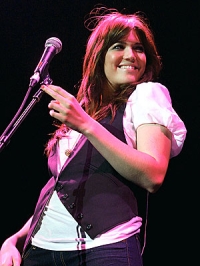
Amanda Leigh "Mandy" Moore (born April 10, 1984) is an American pop singer, songwriter, actress, and fashion designer. She grew up in Florida and came to fame as a teenager in the early 2000s, after the release of her teen-oriented pop albums So Real, I Wanna Be with You, and Mandy Moore. She has branched out into a film career, starring in 2002's A Walk to Remember and later appearing in the lead roles of other movies also aimed at teenage audiences. Two of her later films, American Dreamz and Saved!, were satires in which she portrayed darker characters than in her previous roles. Her private life, including her relationships with tennis player Andy Roddick as well as with actors Wilmer Valderrama and Zach Braff, has been much discussed in the media. Her fifth album, Wild Hope, was released in 2007.
Sally DeFord

Sally DeFord Musical artist Born: 1959 (age 60 years), Eugene, Oregon, United States
Record labels: Defordmusic, Defordmusic.com, Sally DeFord Music, Sally DeFord
Genres: Alt Contemporary Christian, Christian/Gospel
Albums: He Is My Song, MORE
Record labels: Defordmusic, Defordmusic.com, Sally DeFord Music, Sally DeFord
Genres: Alt Contemporary Christian, Christian/Gospel
Albums: He Is My Song, MORE
Mika

Mica Penniman (born 18 August 1983), known as Mika, is a Lebanese-born, London-based, Grammy-nominated and BRIT Award-winning singer-songwriter, who has a recording contract with Casablanca Records and Universal Music. He rose to fame around the end of 2006 and the start of 2007. His birth name is Michael Holbrook Penniman.
Dexter Gordon

Dexter Gordon (February 27, 1923 – April 25, 1990) was an American jazz tenor saxophonist. He was among the earliest tenor players to adapt the bebop musical language of people such as Charlie Parker, Dizzy Gillespie, and Bud Powell to the instrument. Gordon's height was 6 feet 6 inches (198 cm), so he was also known as "Long Tall Dexter" and "Sophisticated Giant". His studio and performance career spanned over 40 years.
Gordon's sound was commonly characterized as being "large" and spacious and he had a tendency to play behind the beat. He was famous for humorously inserting musical quotes into his solos. One of his major influences was Lester Young. Gordon, in turn, was an early influence on John Coltrane and Sonny Rollins. Rollins and Coltrane then influenced Gordon's playing as he explored hard bop and modal playing during the 1960s.
Gordon was known for his genial and humorous stage presence. He was an advocate of playing to communicate with the audience. One of his idiosyncratic rituals was to recite lyrics from each ballad before playing it.
A photograph by Herman Leonard of Gordon taking a smoke break at the Royal Roost in 1948 is one of the iconic images in jazz photography. Cigarettes were a recurring theme on covers of Gordon's albums.
Gordon was nominated for an Academy Award for Best Actor in a Leading Role for his performance in the Bertrand Tavernier film Round Midnight (Warner Bros, 1986), and he won a Grammy for Best Jazz Instrumental Performance, Soloist, for the soundtrack album The Other Side of Round Midnight (Blue Note Records, 1986). He also had a cameo role in the 1990 movie Awakenings.
Gordon's sound was commonly characterized as being "large" and spacious and he had a tendency to play behind the beat. He was famous for humorously inserting musical quotes into his solos. One of his major influences was Lester Young. Gordon, in turn, was an early influence on John Coltrane and Sonny Rollins. Rollins and Coltrane then influenced Gordon's playing as he explored hard bop and modal playing during the 1960s.
Gordon was known for his genial and humorous stage presence. He was an advocate of playing to communicate with the audience. One of his idiosyncratic rituals was to recite lyrics from each ballad before playing it.
A photograph by Herman Leonard of Gordon taking a smoke break at the Royal Roost in 1948 is one of the iconic images in jazz photography. Cigarettes were a recurring theme on covers of Gordon's albums.
Gordon was nominated for an Academy Award for Best Actor in a Leading Role for his performance in the Bertrand Tavernier film Round Midnight (Warner Bros, 1986), and he won a Grammy for Best Jazz Instrumental Performance, Soloist, for the soundtrack album The Other Side of Round Midnight (Blue Note Records, 1986). He also had a cameo role in the 1990 movie Awakenings.
Andy Williams

Howard Andrew "Andy" Williams (born December 3, 1927) is an American pop singer. Andy Williams has recorded 18 Gold and three Platinum certified albums. When Ronald Reagan was president, he declared Andy's voice to be "a national treasure". He had his own popular TV variety show from 1962–71. He also owns his own theater, the Moon River Theatre in Branson, Missouri.
Williams' solo career began in 1952 after his brothers left the act. He recorded six sides for RCA Victor's label "X," but none of them were popular hits.
After finally landing a spot as a regular on Steve Allen's Tonight Show in 1955, he was signed to a recording contract with Cadence Records, a small label in New York run by conductor Archie Bleyer. His third single, "Canadian Sunset" (1956) hit the Top Ten, and was soon followed by his only Billboard #1 hit, "Butterfly" (a cover of a Charlie Gracie record on which Williams imitated Elvis Presley). More hits followed, including "The Hawaiian Wedding Song" (U.S. #11), "Are You Sincere" (U.S. #3), "The Village of St. Bernadette" (U.S. #7), "Lonely Street" (U.S. #5), and "I Like Your Kind Of Love" (U.S. #8) before Williams moved to Columbia Records in 1961, having moved from New York to Los Angeles and gaining another hit with "Can't Get Used to Losing You" (U.S. #2). In terms of chart popularity, the Cadence era was Williams' peak although songs he introduced on Columbia became much bigger standards.
During the 1960s, Williams became one of the most popular vocalists in the country and was signed to what was at that time the biggest recording contract in history. He was primarily an album artist, and at one time he had earned more gold albums than any solo performer except Frank Sinatra, Johnny Mathis and Elvis Presley. By 1973 he had earned as many as 18 gold album awards. Among his hit albums from this period were Moon River, Days of Wine and Roses (number one for 16 weeks in mid-1963), The Andy Williams Christmas Album, Dear Heart, The Shadow of Your Smile, Love, Andy, Get Together with Andy Williams, and Love Story. These recordings, along with his natural affinity for the music of the 1960s and early 1970s, combined to make him one of the premier easy listening singers of that era. In the UK, Williams continued to reach high chart status until 1978. The albums Can't Help Falling In Love (1970), Andy Williams Show (1970) Home Lovin Man ( #1 1971), Solitaire (1973), The Way We Were (1974) and Reflections (1978) all reached the Top 10.
Building on his experience with Allen and some short-term variety shows in the 1950s, he became the star of his own weekly television variety show in 1962. This series, The Andy Williams Show, won three Emmy Awards for outstanding variety program. Among his series regulars were the Osmond Brothers. He gave up the variety show in 1971 while it was still popular and retrenched to three specials per year. His Christmas specials, which appeared regularly until 1974 and intermittently from 1982 into the 1990s, were among the most popular of the genre. Williams has recorded eight Christmas albums over the years and has been penned as Mr. Christmas.
Williams hosted the most Grammy telecasts, from the 13th Annual Grammy Awards in 1971 through the 19th Annual Grammy Awards in 1977, totaling seven consecutive shows. He returned to television to do a syndicated half-hour series in 1976–77.
Williams' solo career began in 1952 after his brothers left the act. He recorded six sides for RCA Victor's label "X," but none of them were popular hits.
After finally landing a spot as a regular on Steve Allen's Tonight Show in 1955, he was signed to a recording contract with Cadence Records, a small label in New York run by conductor Archie Bleyer. His third single, "Canadian Sunset" (1956) hit the Top Ten, and was soon followed by his only Billboard #1 hit, "Butterfly" (a cover of a Charlie Gracie record on which Williams imitated Elvis Presley). More hits followed, including "The Hawaiian Wedding Song" (U.S. #11), "Are You Sincere" (U.S. #3), "The Village of St. Bernadette" (U.S. #7), "Lonely Street" (U.S. #5), and "I Like Your Kind Of Love" (U.S. #8) before Williams moved to Columbia Records in 1961, having moved from New York to Los Angeles and gaining another hit with "Can't Get Used to Losing You" (U.S. #2). In terms of chart popularity, the Cadence era was Williams' peak although songs he introduced on Columbia became much bigger standards.
During the 1960s, Williams became one of the most popular vocalists in the country and was signed to what was at that time the biggest recording contract in history. He was primarily an album artist, and at one time he had earned more gold albums than any solo performer except Frank Sinatra, Johnny Mathis and Elvis Presley. By 1973 he had earned as many as 18 gold album awards. Among his hit albums from this period were Moon River, Days of Wine and Roses (number one for 16 weeks in mid-1963), The Andy Williams Christmas Album, Dear Heart, The Shadow of Your Smile, Love, Andy, Get Together with Andy Williams, and Love Story. These recordings, along with his natural affinity for the music of the 1960s and early 1970s, combined to make him one of the premier easy listening singers of that era. In the UK, Williams continued to reach high chart status until 1978. The albums Can't Help Falling In Love (1970), Andy Williams Show (1970) Home Lovin Man ( #1 1971), Solitaire (1973), The Way We Were (1974) and Reflections (1978) all reached the Top 10.
Building on his experience with Allen and some short-term variety shows in the 1950s, he became the star of his own weekly television variety show in 1962. This series, The Andy Williams Show, won three Emmy Awards for outstanding variety program. Among his series regulars were the Osmond Brothers. He gave up the variety show in 1971 while it was still popular and retrenched to three specials per year. His Christmas specials, which appeared regularly until 1974 and intermittently from 1982 into the 1990s, were among the most popular of the genre. Williams has recorded eight Christmas albums over the years and has been penned as Mr. Christmas.
Williams hosted the most Grammy telecasts, from the 13th Annual Grammy Awards in 1971 through the 19th Annual Grammy Awards in 1977, totaling seven consecutive shows. He returned to television to do a syndicated half-hour series in 1976–77.
Glen Hansard
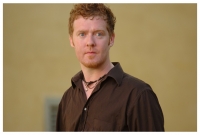
Glen Hansard (born 21 April 1970 in Dublin, Ireland) is the principal songwriter and vocalist/guitarist for Irish rock group The Frames. He is also known for starring in the film Once and co-writing its Academy-Award-winning song, "Falling Slowly."
 Sheet Music Max is a site for those who wants to access popular sheet music easily,
letting them download the sheet music for free for trial purposes.
It's completely free to download and try the listed sheet music, but you have to delete the files after 24 hours of trial.
Don't forget, if you like the piece of music you have just learned playing,
treat the artist with respect, and go buy the original sheet music.
Sheet Music Max is a site for those who wants to access popular sheet music easily,
letting them download the sheet music for free for trial purposes.
It's completely free to download and try the listed sheet music, but you have to delete the files after 24 hours of trial.
Don't forget, if you like the piece of music you have just learned playing,
treat the artist with respect, and go buy the original sheet music.